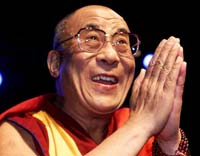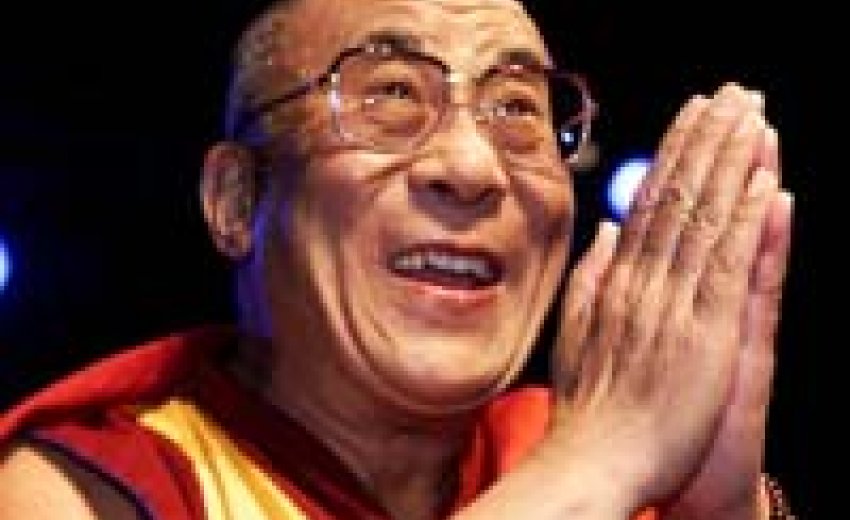 The Chinese Communist leaders think by ignoring the Dalai Lama they would subdue the free spirit of six million Tibetans and earn their loyalty. The leaders in Beijing are in for a bit of disappointment. By giving up his wide-ranging political powers, the 14th Dalai Lama, the man who calls himself a “simple Buddhist monk”, has thrown them a challenge that they would find it almost impossible to face without altering their own long-held repressive policies.
The Chinese Communist leaders think by ignoring the Dalai Lama they would subdue the free spirit of six million Tibetans and earn their loyalty. The leaders in Beijing are in for a bit of disappointment. By giving up his wide-ranging political powers, the 14th Dalai Lama, the man who calls himself a “simple Buddhist monk”, has thrown them a challenge that they would find it almost impossible to face without altering their own long-held repressive policies.
When he announced his plans to hand over all his political powers - from endorsing laws to appointing top officials - to an elected government-in-exile headed by an Indian-style powerful prime minister, the Dalai Lama was not only making way for a smooth transition to a modern, democratic political entity after his death but was also teasing the Beijing leadership to match his ideals of freedom, openness and democracy.
For Beijing’s current Communist rulers, there is no ‘Tibet issue’. The only issue for them is the status and future of the Dalai Lama. The avowedly atheist Communist leadership which has let loose violent repression on Tibetan people, banning even his photographs, has tried all methods to gain total control and loyalty of the fiercely independent and devout Tibetan Buddhist people. They thought the Tibet issue will die out after the Dalai Lama, who will be 76 this July, passes away. They thought time is on their side.
All those calculations have now come to naught. In one fell swoop, the Dalai Lama has undercut their game plan. First of all, by removing himself as the political head of the Tibetan people, he has set in motion a far-reaching reform process - something like separating the church from the state and welcoming and empowering a democratically elected collective leadership to decide the future of Tibet. So, whether Chinese supremo Hu Jintao likes it or not, he or his representatives would now have to talk, if at all, to the Tibetan government-in-exile about the future of Tibet.
Second, he has nipped in the bud the plans of avowedly atheist Communist leadership to create confusion among the Tibetan people by selecting his reincarnation and making him pliable - like they did in 1995 - by picking a young boy as the 11th Panchen Lama. Historically, the Panchen Lama has been the second most important religious figure in Tibet. Most Tibetans however consider the Chinese pick a fake and demand that the boy named by the Dalai Lama be released from imprisonment. Even if Beijing still creates a fake Dalai Lama, the poor fellow will neither have legitimacy in the eyes of Tibetans nor any political powers, since the government-in -exile will from now be the supreme political authority.
Third, to keep up with modern human aspirations of democratic and secular governance, the Dalai Lama has now fully endorsed the democratically elected secular leadership. All the three candidates who are contesting for the post of prime minister in the final voting on March 20 are relatively younger, western-educated, articulate lay people. One of them, Lobsang Sangay, who is barely 43, is a senior fellow at Harvard Law School. Tenzin Namgyal Tethong is a highly respected scholar who teaches at Stanford. The third candidate, Tashi Wangdi, who was educated in India and Britain, was the Dalai Lama’s representative in Brussels, New York and New Delhi. All three of them possess modern outlook and yet they are seeped in their Tibetan identity.
There is no doubt that as long as he lives, the Dalai Lama will continue to be the most influential voice for the cause of Tibet and will work towards his well-articulated “Middle Way” approach that calls for meaningful autonomy for the Tibetans within China. And he was the best bet for the Chinese to have a deal with him for a permanent solution of the Tibet issue, as he alone has had both the spiritual and temporal authority to get the majority of Tibetans to accept his prescription for lasting peace.
By vilifying and turning him into an enemy of the state, the Chinese leadership has lost an opportunity to create real stability in Tibet, upon which, according to the Chinese leaders themselves, depend China’s stability. Once he is gone, the young elected leaders of Tibetans may be forced to revive the demand for total independence for Tibet in the face Chinese belligerence and the repressive policies.
One of the basic tenets of Buddhism is that all things in this universe are impermanent and that includes the Chinese Communist Party’s stronghold on China and over the Chinese people, and the earthly life of the Dalai Lama. For a Buddhist monk and teacher like Tenzin Gyatso, better known as the 14th Dalai Lama, deep understanding of this truth informs all his thinking.
The Dalai Lama knows that the seemingly invincible and monolithic Chinese Communist Party will ultimately disintegrate like his own body will. (He however enjoys exceptionally good health and he believes he will have several decades of active life). Like so many tyrants who appeared unshakable but fell ignominiously. As a Buddhist he also has those fine qualities like patience and tolerance in abundance and he has tried to inculcate the same values among his people.
That is why the Chinese strategy of violent repression and lollipops of modern consumerism has failed to earn the loyalty of six million Tibetans. For nearly 60 years, Tibetans have endured unspeakable torture, denial of rights, basic freedom to worship and constant fear of reprisals. The Tibetans have neither lost hope nor their patience nor their love and admiration for the Dalai Lama. That in itself is their victory over China’s brutal might.
